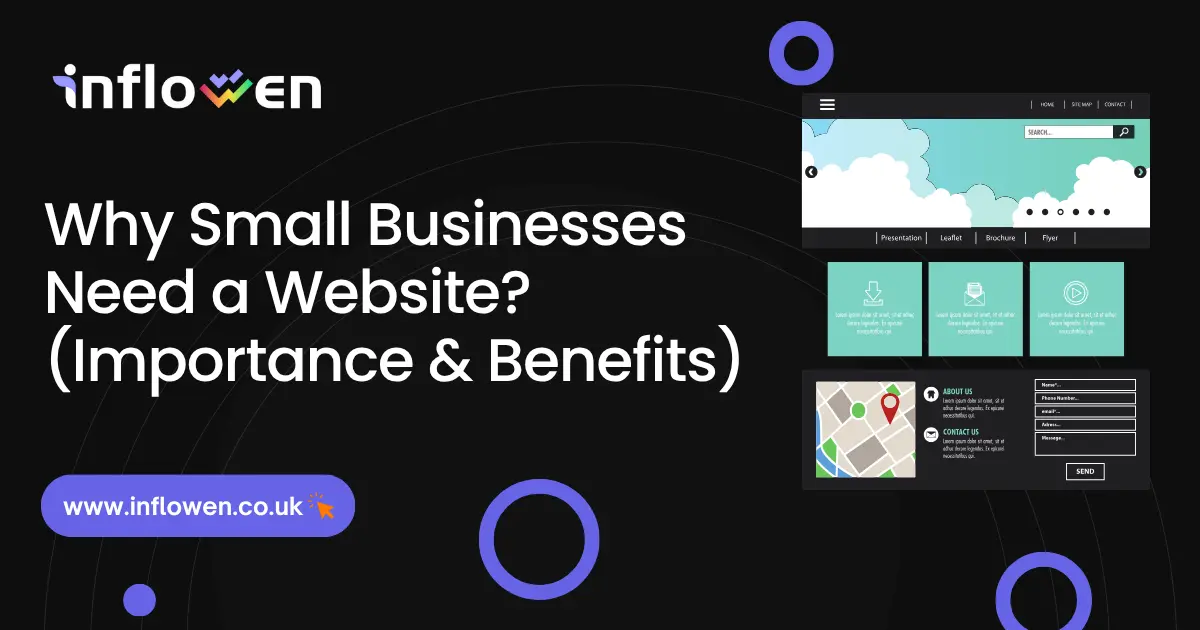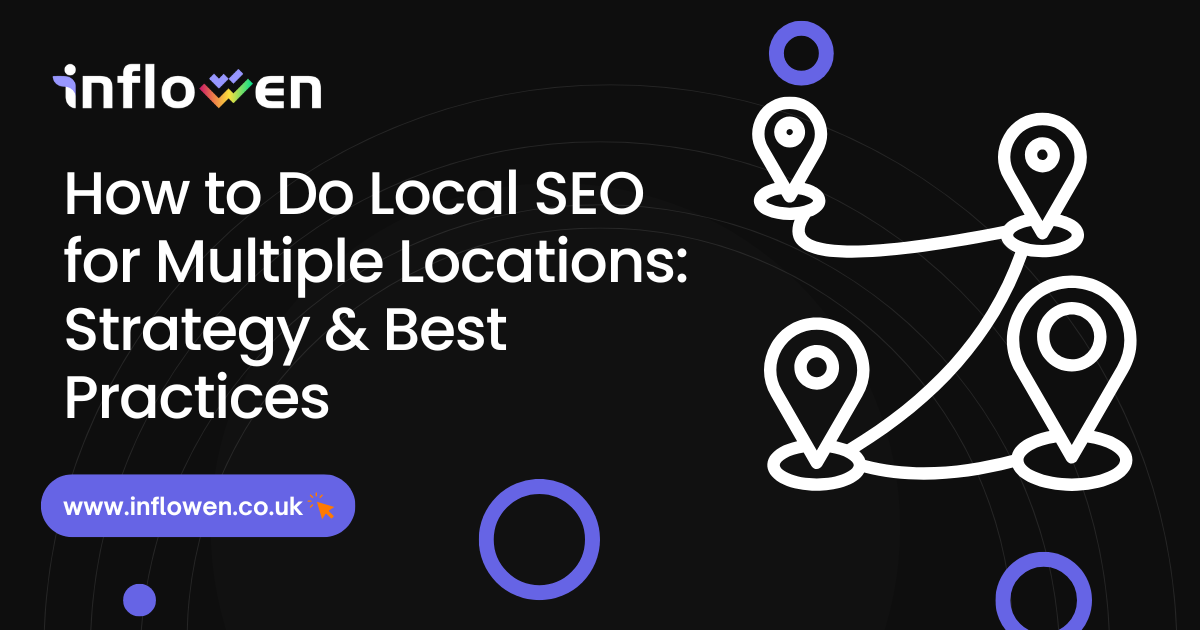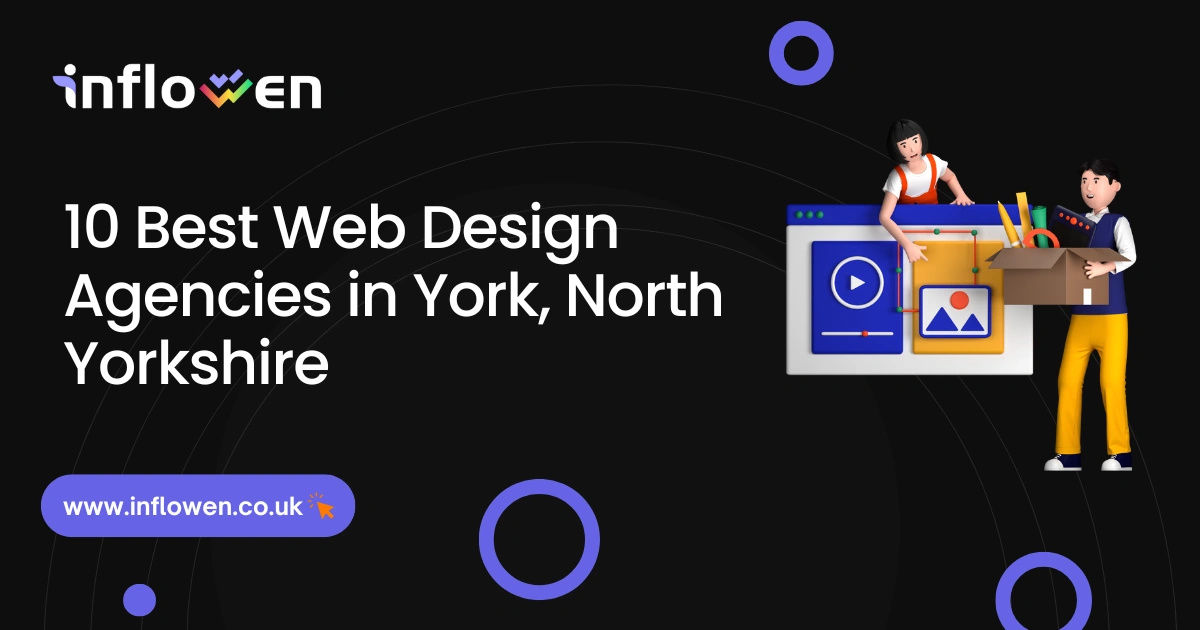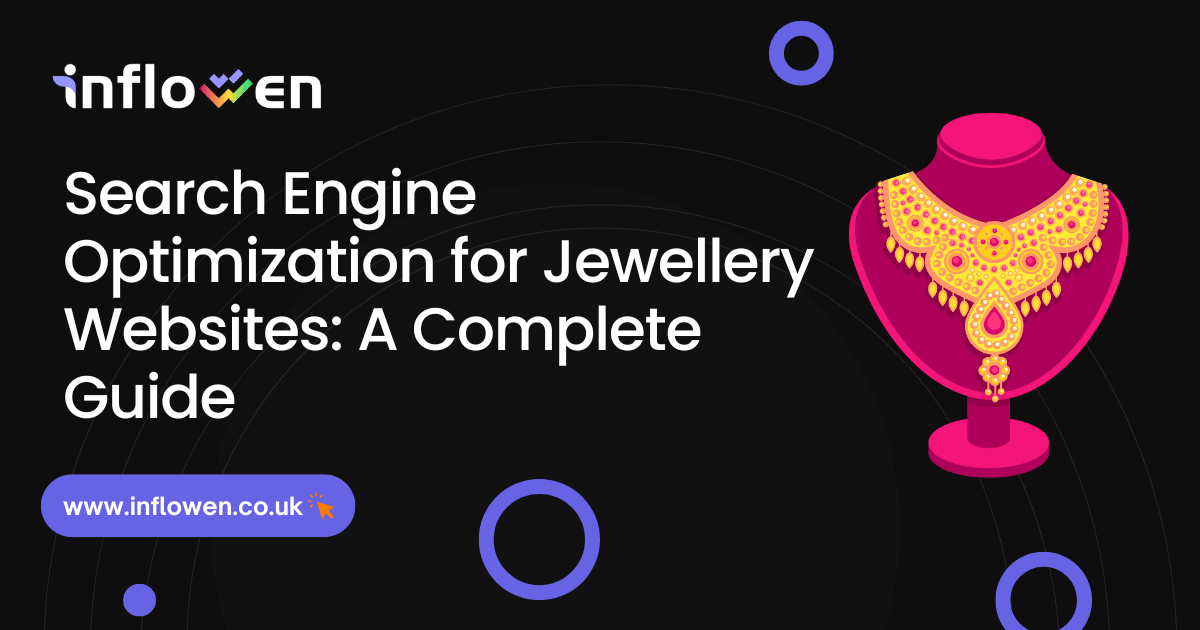Small businesses need a website because it is the foundation of trust, visibility, and growth in today’s digital era. According to Statista, “71% of small businesses have a website”, highlighting its vital role. A website allows you to increase visibility, build credibility, and operate 24/7, making it one of the best ways to compete with larger firms. It also supports cost‑effective marketing, showcases your products and services effectively, improves customer engagement, and lets you track and measure results.
In this article, you’ll learn why a website is critical for any small business and explore its ten benefits, from expanding your market reach to supporting long‑term brand growth. We’ll also show you how to create a website, compare different ways to build one, review trusted website development companies (including Inflowen, one of the best website companies for small businesses), and break down the actual cost of creating a website in both the US and the UK.
Table of Contents
Why Website is important for Small Businesses?
A website is important for small businesses because it serves as the digital foundation of their brand. According to a 2023 report by Zippia, “85% of customers check a business online before making a purchase”, making it a critical factor for trust and sales. The importance of a website goes beyond being a digital brochure — it allows businesses to build credibility, educate customers, and compete with larger firms in a cost‑effective way.
Research from BrightLocal confirms that 64% of people use websites to find and review local businesses before making a purchasing decision. This means that having a website can directly impact revenue by attracting new customers and nurturing trust.
In the next section, we’ll explore the ten benefits of having a website for a small business, from increasing visibility and reaching new customers to supporting long‑term growth and strengthening brand identity.
What are the Benefits of Having a Website for Small Business?
Having a website delivers tangible benefits for small businesses. It is an essential digital tool that attracts new customers, builds trust, and drives sales. Here are the 10 benefits of a website for small business that make it a vital investment:
- Increase Visibility and Reach New Customers
- Build Credibility and Trust
- Available 24/7
- Cost‑Effective Marketing
- Showcase Products or Services Effectively
- Better Customer Engagement
- Stand Out Against Competition
- Track and Measure Results
- Expand Market Reach
- Support and Grow Your Brand
In the following sections, we’ll break down why each benefit is critical and how it impacts the growth and long‑term success of your small business.
1. Increase Visibility and Reach New Customers
A website makes your business discoverable online. It serves as a digital storefront that appears when people search for services like yours. According to Google, “46% of all searches on Google have local intent”, highlighting how vital online visibility is. Small businesses with websites can attract local customers, expand beyond their area, and tap into new markets. This increased exposure translates into higher foot traffic, more leads, and improved sales.
2. Build Credibility and Trust
A website acts as a trust signal for potential customers. According to a Stanford Web Credibility Study, “75% of people judge a company’s credibility based on its website design”. Without an online presence, businesses risk looking outdated or untrustworthy. An optimized site with reviews, certifications, and contact details reassures customers and strengthens trust, making it more likely for them to choose your services over competitors.
3. Available 24/7
A website operates around the clock, allowing customers to learn about your offerings anytime. Even when your office is closed, your website can educate, attract, and convert visitors. This extended accessibility gives small businesses a significant edge, capturing sales and inquiries regardless of time zones or working hours.
4. Cost‑Effective Marketing
A website is a low‑cost, high‑impact marketing channel. Unlike print or broadcast media, a website allows precise targeting, making it ideal for small businesses with limited budgets. It serves as the central point for online ads, email marketing, and social media campaigns, making every dollar spent more effective.
5. Showcase Products or Services Effectively
A website allows you to present offerings with rich media and detailed descriptions. By including high‑quality images, service explanations, and customer reviews, a website gives potential buyers a clear understanding of your offerings. This improves user experience, boosts trust, and increases conversion rates, making it a powerful sales tool.
6. Better Customer Engagement
A website provides a platform for interactive customer relationships. Features like contact forms, chatbots, and FAQs help businesses answer questions quickly and build connections. By making information readily available, a website encourages repeat visits and turns first‑time visitors into long‑term customers.
7. Stand Out Against Competition
A website allows your small business to compete with larger competitors online. In crowded markets, a professional site differentiates your brand, highlights your unique offerings, and delivers a polished user experience. This gives smaller firms an edge by positioning them as credible alternatives to national or multinational competitors.
8. Track and Measure Results
A website provides access to powerful analytics tools that measure performance. By tracking visitor behavior, conversion rates, and sales trends, small businesses can adjust strategies quickly, optimize offerings, and reduce wasted marketing spend. This data‑driven approach leads to higher returns and long‑term growth.
9. Expand Market Reach
A website allows small businesses to connect with a global audience. Even a local service can tap into this global audience, attracting customers from other regions or niches. This expanded reach creates opportunities for increased revenue, partnerships, and brand exposure.
10. Support and Grow Your Brand
A website serves as the central hub for your brand’s online identity. A website allows small businesses to communicate their values, mission, and services clearly. By aligning design, messaging, and customer experience, businesses can create long‑term relationships with their audience, foster trust, and build a strong brand that stands apart from competitors.
How to Create a Small Business Website?
Creating a website for a small company is a straightforward process when broken down into steps. A well‑built site improves trust, captures leads, and showcases services. Here’s an exact roadmap:
- Choose a Domain Name: Pick a short, memorable, and relevant name that reflects your business.
- Select a Reliable Hosting Service: Choose a secure host with a 99.9% uptime guarantee for seamless site performance.
- Plan the Site Structure: Outline essential pages — Home, Services, About, Contact, and Reviews — making navigation simple and logical for visitors.
- Design the Site: Use a clean, mobile‑friendly design.
- Add High‑Quality Images and Copy: Incorporate crisp images, readable text, and compelling call‑to‑actions to build trust and drive engagement.
- Optimize for SEO: Ensure page titles, meta tags, and site structure adhere to best practices for higher rankings and discoverability.
- Launch and Maintain: Test thoroughly before going live, and review site analytics monthly to measure traffic, adjust strategies, and maintain growth.
Each step improves a small company website’s performance, making it a digital powerhouse for sales, trust, and long‑term growth.
What is the Best Way to Create a Website for Small Business?
The best way to create a website for a small business is to hire a professional web design company that understands the unique needs of smaller firms. A trusted company handles critical steps such as planning site structure, creating mobile‑responsive layouts, setting up secure hosting, and optimizing site speed.
Choosing a web design company gives access to advanced expertise in SEO, user experience, and branding, ensuring a site that captures traffic and converts visitors into customers. This approach saves time, reduces costly errors, and delivers a polished website aligned with long‑term growth. In the next section, we’ll review some of the best companies specializing in developing websites for small businesses.
What are some of the Best Companies that Build Websites for Small Businesses?
Small businesses benefit from partnering with expert firms specializing in developing websites for small businesses. Here are trusted options:
- Inflowen – A results‑driven company that focuses on custom websites and mobile‑friendly design for small businesses. Inflowen delivers tailored platforms that boost visibility, capture leads, and support long‑term growth.
- Bluehost Web Services – Renowned for offering affordable website packages and seamless WordPress setups. Ideal for small firms seeking reliable hosting and easy site management.
- Hibu – Specializes in small‑business website design and digital marketing. Provides mobile‑responsive websites and built‑in SEO tools for local visibility.
- WebFX – A full‑service digital agency that builds custom websites with advanced analytics and SEO. Perfect for ambitious small businesses aiming for long‑term growth.
Each of these firms delivers high‑quality site design, mobile responsiveness, and marketing support, making them ideal choices when developing websites for small businesses.
How Much Does It Cost to Create a Website for a Small Business?
Creating a small business website varies based on who does the work. In-house teams (hiring developers on staff) in the U.S. typically cost $100–150 per hour, while in the UK it’s £90–130/hr. Yearly overhead for an in-house team can exceed $30,000–40,000/month, not including ongoing maintenance.
Freelancers charge between $30–150/hr in the U.S., averaging $500–10,000 total for a basic small business site; UK freelancers earn £30–60/hr with full sites costing a few hundred to a few thousand pounds. Agency fees run higher: U.S. agencies charge $1,000–50,000+, or $75–200+/hr, while custom sites from agencies often range $5,000–100,000+.
Additional costs include domain registration ($10–25/year), hosting and SSL ($30–420/year), and maintenance ($100–4,000/year). Overall, total first‑year costs span from $500 (DIY or basic freelancer) to $50,000+ (agency-built custom), depending on complexity, provider type, and location.
Is Inflowen the Best Company for Small Business Website Development?
Yes, Inflowen is a strong contender among the best companies for website building, especially for small businesses seeking tailored, growth-focused web solutions. Founded in 2024 and based in Sheffield, Inflowen offers web design and SEO services with an average hourly rate of just $35–£50/hr, making them both highly capable and affordable.
Tusar Ahmed is the Founder and Senior SEO Specialist at Inflowen. With over seven years of hands-on experience in SEO, local search optimisation, and keyword strategy, he simplifies complex digital concepts into engaging, actionable insights.
Tusar has worked on 250+ projects across the UK and beyond, helping businesses of all sizes improve their search visibility and achieve measurable growth. His writing blends technical expertise with a clear, approachable tone—making SEO feel both accessible and results-driven.
Follow his content for a fresh, practical perspective on ranking better, reaching the right audience, and staying ahead in the ever-evolving digital landscape.



